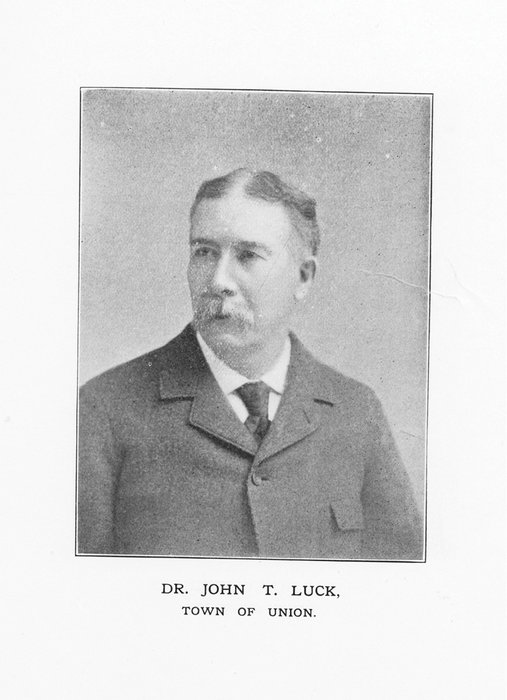“I was taken prisoner by the rebels the morning after the assault on Fort Wagner, South Carolina, July 19, 1863,” U.S. Navy Surgeon John Tarleton Luck wrote in a letter to the editor of the Army and Navy Journal in October of 1865. As Luck was being escorted to the Charleston prisoner’s hospital by confederate soldiers, he noticed Colonel Robert Gould Shaw’s dead body lying next to his deceased black sergeant.
Luck’s letter continues, “Brigadier-General Hagood, commanding the rebel forces, said to me: ‘Had [Shaw] been in command of white troops I should have given him an honorable burial. As it is, I shall bury him in the common trench, with the negroes that fell with him.’”
Luck, who spent his post-Navy days practicing medicine in Union Hill (now Union City) and his final hours in his home in Weehawken, thus became a Civil War whistleblower of sorts.
“[The 54th Massachusetts Regiment infantry] lost every field officer, every captain, and a lieutenant only remained to order it back.” – The New York Tribune, 1863
____________
In further controversy, the nature of Hagood’s alleged statement (which has seen both more harsh and more proper permutations in various publications and historical accounts) lends a decidedly racist tone to what was considered “dishonorable.”
Defining ‘dishonor’
Shaw was the commander of the famous 54th Regiment Massachusetts Infantry, made up of the Civil War’s first assembled black troops. The epic Second Battle of Fort Wagner was memorialized in director Edward Zwick’s 1989 movie “Glory,” and the very scene which Luck alludes to in his letter serves as the film’s dramatic, slow-motion climax.
Racism is clearly implied in Hagood’s alleged statement, as it could be interpreted to mean that a burial alongside black soldiers compounds the dishonor of being buried in a mass grave. However, one must take into account both Shaw’s and his family’s sentiments to see the other side.
In “War and Remembrance from the Iliad to Vietnam,” author James Tatus writes, “Shaw’s family thought it the most glorious internment possible.” In addition, Shaw’s willingness to command the first black regiment in and of itself, in addition to the movie’s screenplay based in part on Shaw’s letters, suggests he would have preferred to be buried with his soldiers.
The 54th
The 54th Regiment Massachusetts was authorized in March of 1863 by Massachussetts Gov. John A. Andrew, just after President Abraham Lincoln issued the Emancipation Proclamation.
Fort Wagner was a Confederate battery that stood south of Charleston Harbor and was widely considered one of the toughest of the Confederate States’ beachhead defenses. Hagood and Brigadier General William B. Taliaferro were in command.
On July 18, 1863, the 54th led a bloody assault on the fort, during which Shaw was shot through the chest and killed during battle with 29 of his men. Twenty-four died later from wound complications, 149 were wounded, 15 were captured, and 52 were never accounted for, bringing the casualty total to 272.
“The 54th Mass (colored reg’t), went into that awful carnage under its noble commander, Col. Shaw, when a Rebel bullet struck as he gained the parapet” the July 27, 1863 edition of the New York Tribune stated. “It lost every field officer, every captain, and a lieutenant only remained to order it back.”
They lost one fourth of their men, which was the highest loss for the infantry during the war. Though the Union was unable to take the fort, the 54th received recognition from Lincoln for its valor and for contributing to their final victory.
From Iowa to war to home
Luck, who is assumed to have been born in Iowa in 1838 as one of 12 children, graduated from Harvard Medical School and Columbia University and practiced in his home state until the civil War began.
Luck entered the Navy on Jan. 29, 1862, and according to Luck’s obituary in the1909 Daily Dispatch, he was “one of the first to answer the call and he entered the navy and was proud of the fact that his commission was signed by Lincoln.”
After he was captured in Charleston in 1863, he was moved to Columbia and confined in a prison there for three months. He was then sent to Libby Prison, notorious for its mistreatment of prisoners. He was released two weeks later.
Luck relocated to Bull’s Ferry Road in Weehawken and set up a medical practice on Bergenline Avenue in Union Hill. He served as post commander of the Grand Army of the Republic Union Hill, was a consulting physician to the North Hudson Hospital, and served as the town’s school trustee and library commissioner for many years.
He died on Jan. 4, 1909 at North Hudson after a long and painful illness, according to the Hudson Dispatch obituary.
Stumbling upon Luck
Union City park enthusiast and local historical preservation advocate Tony Squire came upon Luck’s letter to the editor while researching another Civil War veteran at the New York Public Library. A former Navy corpsman himself who has worked in the medical field, Squire’s attention was caught. At first, he found no biography, diaries, or relatives associated with Luck, then was fortunate enough to discover bits of information through online forums that led to secondary sources and newspaper accounts.
In honor of Memorial Day, Squire contacted the Reporter and passed on his research, and with it he hopes to inspire two things: first, to encourage Civil War researchers to further explore Luck’s military life; and second, that Union City’s Historical Preservation Committee will consider erecting a plaque that lists Union Hill and West Hoboken Civil War veterans.
Gennarose Pope may be reached at gpope@hudsonreporter.com
